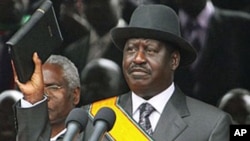Kenya's gay and lesbian communities say they are confused and worried after the country's prime minister called for the arrest of homosexuals.
Recent statements made by Kenyan Prime Minister Raila Odinga have many gay and lesbian activists concerned that the country's gains in civil rights could be erased. Speaking Sunday at a rally in Kenya's largest slum, Kibera, Mr. Odinga told supporters that none would be spared from laws in the new constitution that criminalize homosexual acts. The premier said that any Kenyan found engaging in homosexuality or "lesbianism" would be arrested and jailed.
Engaging in "homosexual acts" is currently a crime in Kenya, punishable by up to 14 years in prison.
Mr. Odinga's comments have provoked a measure of panic from Kenya's gay and lesbian community. A board member of the Gay and Lesbian Coalition of Kenya, Nguru Karugu, said the comments could potentially drive Kenya's gay and lesbian communities underground.
"The community will now fear and go back in," said Karugu. "Fear to go to testing, fear to go to health clinics, fear to get services, fear to go to the police, for fear of being arrested or being harassed. It was a major blow for some pretty good work that has been going on the last few years."
Karugu said the Coalition is asking for clarification of the statements made by the prime minister, which he described as "out of left field." Gay and Lesbian issues have been a relatively untouched subject in Kenyan politics during the tenure of President Mwai Kibaki.
The Prime Minister has similarly had relatively little involvement in the issue, but the coalition said his comments were detrimental to the country's fight against HIV and AIDS.
Kenya's National AIDS Control Council has recently moved to include gay and lesbian outreach in its fight against AIDS. In January, the prime minister attended and helped launch the group's 2010 Strategic Plan - the first that promised to work with homosexuals and other high-risk groups.
Clarifications made by the Prime Minister's office have called the remarks "off the cuff" - saying they did not indicate a shift in government policy. Kenya's new bill of rights prohibits discrimination on any grounds, but Karugu believes many will take Mr. Odinga's words as sanctioning discrimination against homosexuals.
"Not only are people in their neighborhoods now feeling that they can easily be attacked because the prime minister - who is definitely a respected man in the country - said this, but healthcare workers who were before not sure whether they should deal with you or not may now choose not to," said Karugu.
During the past two years, a series of anti-homosexual legislation has swept through the region, leaving many fearful that Kenya could soon adopt stricter measures against homosexuality.
In 2009, a bill criminalizing homosexuality in Burundi was signed into law by President Pierre Nkurunziza. The Rwandan parliament also considered a similar bill that was thrown out after debate.
In the same year, Uganda introduced a bill that would, in certain situations, impose the death penalty on people caught engaging homosexual acts. The punishment of death was later removed due to international pressure. The bill is still under consideration by the Ugandan Parliament.




